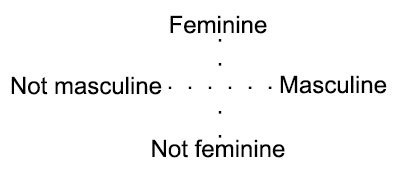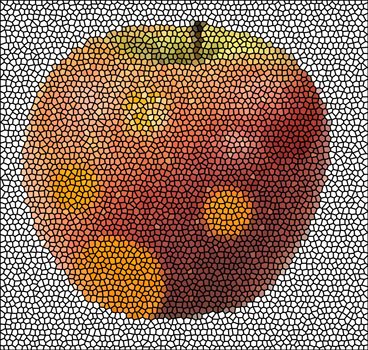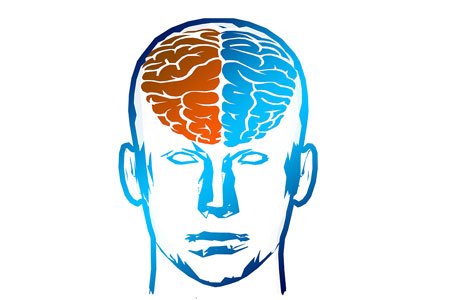
"There's a fine line between genius and insanity." - Oscar Levant
Source: Pxhere
Curtain open: 135 studies of brains
Remember how, in the previous post of this series, I talked about the twirls of the mustache curve (also known, less imaginatively, as tails of the bell curve), and how men are overrepresented at both those ends, which might mean more men geniuses, but also more men Beavis & Butt-heads?
Well, a large 2013 meta-analysis of 135 studies investigated the question of whether there are brain differences between the sexes. Result? It found several differences in the brains of the two sexes.
What was rather more interesting—and which relates to the mustaches—was that the differences found were in areas of the brain usually implicated in psychiatric conditions:
The majority of the regions displaying sex differences in this meta-analysis also show structural differences between typically developing individuals and individuals with neuropsychiatric conditions (areas of the limbic system, e.g., amygdala, hippocampus and insula) such as autism [...], depression [...], schizophrenia [...] and attention deficit hyperactivity disorder [...], providing some bases for the hypothetical view that factors driving the development of typical sex differences might also play a role in the emergence of these neuropsychiatric conditions.[8]
Note that, from that example list of neuropsychiatric conditions you just read, only depression is associated with females. The rest of those lovely conditions (autism, schizophrenia, ADHD) are all associated with (=prevalent in) males.
Also note that, although brain differences were found, linking these brain differences to behavior differences is another matter:
[T]he link between function and structure is still under-explored; no predictions as to how structure may influence physiology or behaviour are possible from these meta-analyses.[8]
Well, in this post, I'm going to explore precisely that! In other words, knowing that there are brain differences between males and females, what might these brain differences mean?
Don't expect I'll offer any conclusive answers, as these are difficult-to-settle issues. But, if anything, the answers I'll explore will be interesting.
So let's dive in.
Does being more feminine make you less masculine?
Picking up the thread of personal anecdotes relating to the time when I Was a Teenage Philosopher (looking for someone to produce the movie, btw) that I began in the last post, let me tell you another thing I discovered in my teens.
My reading of the biographies of many let's-call-them "great individuals", whom I admired and who happened to be male, gave me the impression that they were more feminine in their characteristics than the average male Joe. However, when I asked myself the question "does this mean they are less masculine?", the answer was a sonorous "no". In fact, the reverse seemed to be the case.
But how is it possible to be more feminine and more masculine at the same time? To be more specific, these people were often, even usually, aggressive, stubborn, workaholic, goal-oriented go-getters—traits usually associated with masculinity. Yet they were sensitive, prone to crying during musical performances or theatrical plays (or when horses were being flogged), were (most of them) romantic as opposed to promiscuous and cynical, etc. Could it be that a characteristic of genius is that it encompasses the best traits of both sexes? Could geniuses be, to a degree, androgynous, at least mentally if not sexually?

Is this what a genius looks like on the inside?
Source: Patrick Whitaker
Reinisch et al. offered a nice model that graphically explains why more feminine =/= less masculine, and which illustrates the new understanding in the literature that feminine and masculine are not opposite ends of a bipolar continuum, but are independent or semi-independent factors.[10, p. 223]
The old model visualized feminine and masculine as opposite ends of a spectrum, so that moving toward one end, necessarily moved you away from the other:

A new model had the traits be completely independent, so that moving toward one didn't mean you were moving away from the other. In fact, you could even move toward both at once (upper right quadrant).

Or the relationship could be semi-independent, so that moving toward one may move you slightly away from the other.

Arranging words on a page next to dotted lines sure looks pretty and all (so pretty that Nabokov referred to the practice on the very first page, second paragraph, of his famous novel Lolita), but where's the scientific human data that shows that a given person can actually be more feminine without being less masculine?
Let's join our 5 rings and call for Captain Meta-Analysis!
A 2015 analysis of the datasets of 1400 human brains as well as the personality traits, attitudes, interests, and behaviors of more than 5,500 individuals, reveals that all these traits are like pieces of a mosaic (hence part of the paper's title, "The human brain mosaic"), so in essence a particular individual could have almost any combination of them.
Our study demonstrates that although there are sex/gender differences in brain structure, brains do not fall into two classes, one typical of males and the other typical of females, nor are they aligned along a “male brain–female brain” continuum. Rather, even when considering only the small group of brain features that show the largest sex/gender differences, each brain is a unique mosaic of features, some of which may be more common in females compared with males, others may be more common in males compared with females, and still others may be common in both females and males.[9]
This just goes to show that in real life, individual differences are much more important than average differences.
In other words, it's like someone has put all the female characteristics in one basket, and all the male characteristics in another basket. All you have to do to be recognized as a male, is pick the majority of your characteristics from the male basket. But it doesn't mean you'll have much in common with another male, who might have picked different characteristics. You might have more in common with a female, who is still a female despite your commonalities, since she picked most of her characteristics from the female basket.

You still recognize this mosaic as an apple, even though it's some parts orange.
Source: Evan-Amos & Nick Youngson Alpha Stock Images, modified
In this sense, my teen intuitions are vindicated: it's perfectly possible to be more masculine and at the same time more feminine.
Take, for instance, Quentin Tarantino, whose bloody Kill Bill will leave little doubt as to his masculinity. And yet, unlike the average male, and despite his movie Death Proof, he's no interest in cars.

"Well, I'm not into cars. A car is something that simply takes you from one place to another. The red Chevy Malibu that John Travolta drives in Pulp Fiction is mine. I could give a shit about it." - Playboy Interview, 1994
Source: Gage Skidmore
"A car is just something to take you from point A to point B." I've been saying this quote for years, and I was full of glee when I heard one of my cinematic heroes identify with it. (That quote may have been co-opted, but I have other quotes up my sleeve, like "a car is a glorified shoe-sole".)
Most high-achieving males will have zero interest in athletics and things that move on 4 wheels, unless it's part of their job, like being an engineer of sorts.

A Tesla and some buy obscuring the view.
Source: Maurizio Pesce
Where was I going with this? I don't know what I'm supposed to be writing about anymore.
Oh yes, something about brains.
There's Something about Brains
-.jpg)
Source: The Conmunity - Pop Culture Geek
You'll remember I started the last section by anecdotally noticing that men were at the same time more aggressive goal-oriented go-getters, and more sensitive. They didn't mind slaying Gods in their spare time, but went all teary-eyed when they saw an opera by Wagner.
But why can't the same hold true for women? Can't women be more of those things at the same time? Well, they can, to a degree. But not as extremely. Why is it that they can't reach the end points of the mustache as well as men? And what does this mean in real life?
If you remember the corpus callosum sections from the post before last (Pt 1), it was shown there that the corpus callosum is bigger in females than in males. The corpus callosum, you will recall, it a trans-hemispheral brain communication device. I.e. it enables better and faster communication between the brain hemispheres. And it's bigger in women, meaning that there's better communication between the brain hemispheres of women.
Or more signal-scrambling, depending on how you want to look at it!
You see, men are better than women at cognitive tasks having to do with math and spatial reasoning and showing emotion on the left side of the face (which is controlled by the right brain hemisphere).[10, p. 227] Women, having more equal hemispheres (due to their better communication), are not as bimodal in expressing emotion on either side of their face. The left side is still better at it, but the difference is not as great as in men.
Most of their other abilities are similarly spread out, whereas men's are specialized in one of the two hemispheres.
How does this explain why men can be more logical (mathematical) and emotional at the same time, like Shakespeare?
My pet theory on why this happens, is that (to use a stereotypical and perhaps chauvinist example), a woman might have as good a logical brain as a man, but its signals will be interfered with by her emotions, given how the two parts of the brain communicate better. And her extreme emotions will also be tempered by reason, contrary to stereotype. (Try threatening a woman with violence, and see how good she is at quickly putting her emotion under control. Then do the same to a man, and watch as things escalate.)
A man, on the other hand, will be better able at blocking signals from the half of the brain that he thinks does not relate to the question at hand. He will therefore be at the same time more logical and more emotional, depending on circumstance. If you give him math, he will be able to autistically devote himself to it, without letting emotion (or hunger) get in the way. If you give him an emotional situation, however, he might risk body and limb in a reckless fashion, which translates statistically as a vastly greater number of male deaths and criminality that arise from those situations, for example up to 4 times more men committing suicide compared to women[11], or 93% of the prison population being men (you may see this as evidence of a more violent temper, or, as I do here, as evidence of a weaker ability to control emotion).

These are usually the only handcuffs women ever get to wear!
Source: Pxhere
Again, this is just a pet theory of mine. Don't confuse it with the scientific fact, which is that men's brains are more laterized, more specialized if you will, than women's. (Apparently, the stereotypical trait of female cooperation is hardwired, in a sense, in the female brain!)
But I know readers of my articles are not impressed by pet theories. I know you want hard science. And hard science you will get! (well, maybe soft science, in some cases)
Let's start with that pretty offensive remark about women who are threatened with violence being better able to control their response to it compared to men.
[G]ender differences in aggression were larger for those aggressive behaviors or situations in which women, more than men, perceived that the behavior would harm someone or that the behavior could bring danger to oneself.[2, p. 113]
And far be it from me to fail to gloat-mention that the quote you just read is from a feminist researcher, who is a female to boot. And who tries her darnedest to explain away all sex differences, but some, like aggressiveness and spatial abilities, stubbornly persist.
So back to the quote: men were like, "dive in now, get your oxygen tank later". If they throw themselves with equal single-mindedness at other tasks, such as mathematics, it's no wonder they're better at it.
And don't think that others haven't thought the same before me:
[F]uture consideration of gender differences in mathematics should address the issue of single-minded concentration. Personal communications from several male and female professional mathematicians suggest that one important factor in mathematical research, to a greater extent than for other academic subjects, is the ability to concentrate single-mindedly on a problem. They also suggest that, certainly for social and perhaps also for biological reasons, women may be more able than men to pay attention to several topics at once and may be less willing or able to focus attention in the exclusive way demanded by advanced mathematics.[14, p. 251; note the author is female]
This is my intuition as well.
But hard evidence > intuition.
And it doesn't get more hardcore than brain lesions. Let's see how literally single-minded men are!

Source: geralt
You see, if women's brains are less specialized, you would expect less loss of function after an incident that affects only part of the brain. And that is, indeed, what we get:
[Females] show greater recovery from aphasia after stroke, suggesting that function lost in one hemisphere can be acquired in the other. Further support for this notion can be found in the differential response to unilateral brain lesions. Following brain lesions females show no difference in Verbal or Performance scores on the Wechsler Adult Intelligence Scales (WAIS) , whereas males have depressed Verbal IQ scores with left-brain lesions and performance deficits with right-brain lesions[10, p. 227]
Hey, at least now you can call your man a two-faced bastard and have the scientific evidence to back your claim! Here's a second source if you're dating a skeptic:
This added anatomical evidence that "connectedness" across the hemispheres is sexually dimorphic goes along with a survey which found that females seem to process certain kinds of information with both hemispheres, whereas males tend to rely more on one hemisphere or the other [...]. For example, the incidence of aphasia (an inability to understand or use words) after left-hemisphere lesions is at least three times higher in men than in women. This suggests that females may process language more with both hemispheres.[13, p. 122]
Are you particularly mad at your partner today and are searching for more accusations to throw at him? Look no further!
Polygyny

Sea Lion harem.
Source: Max Pixel
To an average Joe or Jane like you and me, saying that males have a spatially superior brain might "signify nothing" (Macbeth: Act 5, Scene 5, Line 28).
But to an animal researcher, it might signify quite a lot.
Take for example one study that showed that castrated males (of the rat species, not human) performed worse in spatial tasks compared to normal males, and they "did not [...] attend to geometric cues".[1, p. 237] (Frankly, if I was castrated, I think there'd be very little I would attend to.)
Further research suggested that this sex difference is restricted to polygynous species.[1] The theory is that males who roam farther from the nest to look for sexual opportunities, will be served well by a higher spatial ability, whereas males who are as monogamous as females will have no need for it. Thus, for example, "Prairie voles from the Midwest United States are monogamous, whereas meadow voles from Pennsylvania are polygynous."[13, p. 122] They were fitted with radio transmitters to check their travels, and were trapped and tested for visuospatial ability in mazes.[13, p. 122] Result?
[O]nly polygynous meadow voles showed consistent male superiority on spatial tasks.[13, p. 122]
Blimey!
But, I mean, we know human males are better at spatial tasks, but surely there's no evidence that they like to roam farther than...
In preliterate societies, and among children in Western societies, human males also tend to have larger "ranges" (or play areas) than human females[1, p. 237]
Those damn scientists like to stick their noses everywhere!
In other words, the fact that this spatial sex difference exists in humans, might indicate that humans are polygynous (which is different from polygamous, in that polygamous species are ones in which both males and females would enjoy a harem, whereas polygynous is where males would like many wives whereas females are like "I'd rather pick the best one").
Other indications that humans are polygynous are their greater morbidity and mortality ("live fast die young"), which is seen in most polygynous species.[1, p. 238]
For the female and monogamously inclined among you, do not despair: there is evidence that males are more varied than females in this (as in many other) areas. Females tend to be much more similar to each other, whereas males tend to exhibit greater extremes. And the same could be true for their tendency to be monogamous or polygynous:
It is very possible that human males are more variable than human females in their reproductive strategies, with some males favoring short-term mating opportunities and others showing high levels of investment in their martial relationship and in the resulting offspring[1, p. 238]
Btw, I don't know what is meant by "martial relationship". A typo for mutual? Matrial? Marital? (most plausibly) Is it only found in sheriffs? Heck knows.
(I wonder why the domain name askheck.com hasn't been claimed yet. It could make a good Quora-style site.)
Are women more complex than men? Murphy's definitive answer.

Butter Side Down. A good name for a rock band. Much better than System of a Down, IMO.
Source: EgoVolo
In the last post I mentioned estrogen's protective effect against mutations. Another reason why males might show greater variability and extremeness (which, to repeat, can be bad as well as good) is simply in the nature of males being the end result of a more complex process.
Yes, despite what you may have heard, males are literally more complex than females, not the other way around!
At least, when seen from the perspective of Murphy's Law ("everything that can go wrong will go wrong, especially toast landing butter side down"). Plus some entropy for good measure.
You see, the more complex a thing is, the more chances something will go wrong. A female is nature's default, it's what the fetus will become in the absence of testes and fetal androgens (male hormones). In order to make a male, things must be added. Since added things make stuff more complex, there's greater chances stuff will go wrong. If we see stuff going wrong more often in males than females, chances are males are more complex.
Concomitant to the more complex process of male differentiation is the increased possibility of developmental anomalies [...] As Alfred Jost so eloquently stated, "Becoming a male is a prolonged, uneasy, and risky venture. It's a kind of struggle against inherent trends toward femaleness"[10, p. 222-3]
So it's no wonder that males suffer from more cognitive disabilities:
[T]he frequency of mental retardation, stuttering, dyslexia, learning disabilities, delayed speech development, and left-handedness is higher among males than females[10, p. 234]
Yeesh! It's times like this I'm reminded how lucky I am I'm not left-handed!
So there you have it, the definitive scientific answer to whether females are more complex than males.
Curtain Close

Did I hear someone say "finally"? 😑
Source: Anna Langova
So let's recap what we learned today.
Males are more variable in many cognitive abilities (which might translate to being better at math and other cognitive tasks), and also at much greater risk than females for an array of neurodevelopmental and other physiological disorders.[1, p. 238] As in life, so in brain, success means taking risks!
You can be more feminine and more masculine at the same time. So don't listen to them naysayers! Do what you've always wanted and don't be shy!
Except cars. Only girls like cars.Women's brain hemispheres cooperate better. As in real life, cooperation can prevent a bad idea from taking over and bringing ruin. But it can also stifle the expression of original thought and promote mediocrity. Single-mindedness can sometimes be good.
A superior spatial brain might mean more polygynous tendencies. So watch your man's navigational skills. Be very, very suspicious if he never needs to ask for directions.
Ask not what women want. Ask what men want. Men are more complex than women.
The above findings are based on many hundreds of studies across a diverse spectrum of human activities that entail visuospatial, auditory, musical, motor, emotional, and linguistic skills. Despite the confusion, complexity, and related political issues that abound in the literature, this body of information converges on a clear bottom line: finely shaded but significant sex differences characterize human behaviors. [13, p. 123]
This last quote is from a volume titled "Women In Human Evolution", a female and feminist-centered critique of a field traditionally dominated by men.
Lastly, I want to apologize for yet another long post. Despite appearances, I do try and condense the info.
Or maybe I need not apologize? Yes, the sex differences field has my back! :
In terms of [...] total talking time, males exceed females [...], contrary to stereotypes.[3, p. 234]
What can I say. I'm a typical male!
REFERENCES
1. Geary, D. F. (1996). Sexual selection and sex differences in mathematical abilities (with commentary and rejoinder). Behavioral and Brain Sciences, 19, 229-284. https://www.researchgate.net/publication/279976798_Sexual_selection_and_sex_differences_in_mathematical_abilities
2. Hyde, J. S. (1996). Where are the gender differences? Where are the gender similarities? In D. Buss & N. Malamuth (Eds.), Sex, power, conflict: Evolutionary and feminist perspectives. New York: Oxford Univ. Press. http://www.oupcanada.com/catalog/9780195103571.html
3. Hyde, J. S., & Linn, M. C. (1988). Gender differences in verbal ability: A meta-analysis. Psychological Bulletin, 104, 53-69. https://www.researchgate.net/publication/232528001_Gender_Differences_in_Verbal_Ability_A_Meta-Analysis
4. Linn, M. C., & Petersen, A. C. (1985). Emergence and characterization of sex differences in spatial ability: A meta-analysis. Child Development, 56, 1479-1498. http://www.jstor.org/stable/1130467
5. Reinisch, J. M., Ziemba-Davis, M., & Sanders, S. A. (1991). Hormonal contributions to sexually dimorphic behavioral development in humans. Psychoneuroendocrinology, 16, 213-278. http://dx.doi.org/10.1016/0306-4530(91)90080-D
6. Resnick, S. M., Gottesman, I. I., & McGue, M. (1993). Sensation seeking in opposite-sex twins: An effect of prenatal hormones? Behavior Genetics, 23, 323-329. https://link.springer.com/article/10.1007%2FBF01067432
7. Udry, J. R. (1994). The nature of gender. Demography, 31, 561-573. https://link.springer.com/article/10.2307%2F2061790
8. Amber N.V. Ruigroka, Gholamreza Salimi-Khorshidi, Meng-Chuan Lai, Simon Baron-Cohen, Michael V. Lombardo, Roger J. Tait, John Suckling. A meta-analysis of sex differences in human brain structure. Neuroscience & Biobehavioral Reviews Volume 39, February 2014, Pages 34-50. https://doi.org/10.1016/j.neubiorev.2013.12.004
9. Daphna Joel, Zohar Berman, Ido Tavor, Nadav Wexler, Olga Gaber, Yaniv Stein, Nisan Shefi, Jared Pool, Sebastian Urchs, Daniel S. Margulies, Franziskus Liem, Jürgen Hänggi, Lutz Jäncke, Yaniv Assaf. Sex beyond the genitalia: The human brain mosaic. Proceedings of the National Academy of Sciences Dec 2015, 112 (50) 15468-15473; https://doi.org/10.1073/pnas.1509654112
10. Reinisch, J. M., & Sanders, S. A. (1992). Prenatal hormonal contributions to sex differences in human cognitive and personality development. In A. A. Gerall, H. Moltz, & I. L. Ward (Eds.), Sexual differentiation: Handbook of behavioral neurobiology (Vol. 11). New York: Plenum. https://www.springer.com/gp/book/9780306439834
11. Wikipedia contributors, "Gender differences in suicide," Wikipedia, The Free Encyclopedia, https://en.wikipedia.org/w/index.php?title=Gender_differences_in_suicide&oldid=836685351 (accessed April 30, 2018).
12. Levy, J., & Heller, W. (1992). Gender differences in neuropsychological function. In A. A. Gerall, H. Moltz, & I. L. Ward (Eds.), Handbook of behavioral neurobiology (Vol. 11). Sexual differentiation. New York: Plenum. https://www.springer.com/gp/book/9780306439834
13. Falk, D. (1997). Brain evolution in females. In L. D. Hager (Ed.), Women in human evolution. New York: Routledge. https://books.google.com.cy/books/about/Women_In_Human_Evolution.html?id=6Tl8g2uQNaIC&redir_esc=y
14. Dowker, Ann. How important is spatial ability to mathematics? in Geary, D. F. (1996). Sexual selection and sex differences in mathematical abilities (with commentary and rejoinder). Behavioral and Brain Sciences, 19, 229-284. https://www.researchgate.net/publication/279976798_Sexual_selection_and_sex_differences_in_mathematical_abilities
Earlier Sex Differences episodes:
4: Sex Differences: Do females and males have different brains? Pt 2
3: Sex Differences: Do females and males have different brains?
2: Sex Differences: Check out the gonads on that one!
1: Sex Differences: Does the Chromosome Maketh the Man?
steemSTEM is the go-to place for science on Steemit. Check it out at @steemstem or browse the #steemSTEM tag or chat live on discord
Another awesome entry to the series. Don't worry about the posts being too long. The quality remains high throughout.
I do wonder if males suffer from more cognitive disabilities only because the development is more complex, or if other factors like having only one X chromosome play a role.
Though I have no objection to the written content of this article. I do have to object to your atrocious apple/orange hybrid. I came hear to learn about sex and not see some hideous plant amalgam that flies in the face of god!
Another nice post on this topic. And only neutral comments. Damned... i was not expecting this to be honest.
I honestly have never considered we could be more masculine and feminine at the same time, but this just all makes sense. These things should stopped being seen as contraries. And maybe this will calm down those gender equality aficionados (I have nothing against them, but sometimes, the employed arguments are just not arguments...).
One important hidden message from your post is that there is also no free lunch. If one gains somewhere, there is a cons somewhere else and vice versa :)
And now the less serious part...
He however likes Chartreuse, which is a strong sign about him being a good person! :)
PS: Captain planet? My teenager years are back in force ;)
PS2: Are you Canadian? (@Kryzsec could potentially help you here :p)
Exactly!
The color, or the drink? :P ... I don't think I ever tried the drink actually. Though when it comes to drinking alcohol, the monks always have good taste!
Yup, my teenage years suddenly creeped up on me for some reason! Of all the things to remember!
No, not Canadian, just Greek Cypriot. We got some good monastery wines here!
I loved your comments btw!
This has been a very enlightening series! It definitely helps with understanding the Beavis types...Nice work!
And the long awaited last part. Hopefully not the last part.
Long read, had to read part 1 and 2 again on a clear head.
You have very interesting hypotheses and I really hope to read more on the matter as this is very interesting to me.
Indeed, I have never thought about masculine and feminine being two different axis. Would this dare to explain the "in-between" genders and if so, is anyone else knowing it? Since it seems to me it's pretty important.
Also another question that arises is: can we test our children and supplement the hormones, is there a "normal" level? Would we want to modify the hormones in children? Are there laws for this? If a parent senses (or measures) the hormones in his child, could he and should he act to supplement that missing or reduced hormone?
I mean we have Pandora's Box right here.
It's definitely not going to be the last part of this series (on sex differences), but it's the last part of the brain series (for now!)
One of the most famous sex researchers, John Money, tried to do something like what you're talking about, and it didn't go well. As usual in science, knowing how things work doesn't mean we know how things ought to be (the famous gap between the is and the ought that David Hume talked about: science studies the is, ethics the ought).
I think those differing levels of hormones create all these wonderful experiments that make the world a more interesting place, and create those accidents that will then become our artists and thinkers. But in some cases, since parents have the legal rights over the child, doctors may step in, with their concent, to fix something seen as a problem, which is sometimes so grave that it seriously hampers regular functioning of the child.
Thanks for the comment and the read!
I have really appreciated the articles and the fact that you throw your David Hume or Lolita quotes. Really kept it funny and easy to read, despite the sheer quantity of the different info presented. Best read of the week.
10 min reading by I regret nothing :D
Great post! As usual... Don't become overconfident!
I think I'll dream about prairie voles with the transmitters.
In my mind, they are super cute.
Wait, is that a girl talking from my body?
We were all girls first, males second! :)
Don’t apologize unless it’s the build up to the punch line.
More male vs more female vs who decides what characteristics are more one than the other. Aka what are those traits specifically, and why are they associated more with either of the respective sexes[?] - rhetorical question(s) perhaps... ?
Well I used the example of the baskets as an analogy, if that's what you're referring to.
The specific paper was a meta-analysis of other studies, so the subjects (people) were defined as male or female by those studies, probably by the people themselves. Their brains were scanned, or personality profiles questionnaired, and those that were more prevalent in males were defined as male, and those more prevalent in females were defined as female. That's at least one way it can be done.
And the result was substantial variability as well as lack of internal consistency:
The reason some traits may be associated with some sexes might have to do with their reproductive strategies, but that whole interesting chapter will be explored in the future!
I get the basket thing. It’s the study that you described after that I was asking for and...
Yeah I assumed that this method of categorizing masculine vs feminine characteristics would be the preferred and “objective” way of determining it (masculinity/femininity).
But I guess what I’m really alluding to or questioning is the wording. More implies that things are being compared and that the non “more” thing would have or be less. So if a male is more feminine than shouldn’t he be less masculine? I understand (I think) conceptually that what you mean is:
if there are two “bars” representing either characteristic, masculinity and (not vs) femininity, then this male would have high readings on the bar of both masculinity and femininity....and therefore it doesn’t necessarily make him non or less masculine....?
So yet again I’m just presenting my devil’s advocate, skeptical, cynical perspective and inquisition, seeking clarification and enlightenment for myself and anyone who might be reading.
🧔🏻🧠👱🏿♀️ :)
You're right about the bars. That's what's meant. An increase in masculine behavior (masculinization) is not necessarily associated with a decrease in feminine behavior (definimization). And moving toward femininity doesn't mean you're moving away from masculinity. You could be both very masculine and very feminine at the same time (a British dandy? all the rock stars of the 70s?), while another person is lower in both masculinity and femininity than you are.
For the most part I agree, but there are some behaviours which are either/or. If you are sitting in a bar with a drink you can't simultaneously sit like James Bond and a female fox news commentator.
Yes that makes logical sense. I think though that most of the either/or situations are where, for example, you are either violent or not violent, you can't be both. People often view non-opposite things as being opposite, as when for example crying during movies is seen as, for some strange reason, as de-masculinizing. I can't imagine any man who has ever created a worthy piece of touching art, not crying at his or someone else's creation. Those are the types of fake contradictions that we should guard ourselves against, even though, of course, as you say, there are also genuine either/or cases.
Agreed on the tendency to see things as opposites when the reality is more complex. I think our minds do have a bias towards simple explanations. Very well-written series, I enjoyed it and learned a lot.
Lol nice parenthetical examples.
Absolutely not at all. On top of that I'd say there could be many childlike qualities involved too. Yoko Taro who is the genius auteur behind Nier: Automata is a good example:
Childlike qualities may not necessarily be present in "great individuals" but some "great individuals" may never grow out of some childish personality traits. As a person who refuse to acknowledge that Quentin Tarantino make violent movies (Try Takashi Miike if you want someone who isn't a pussy about violence) and I was one of the top performing students in my class and I'm the only adult male in my personal life who still like baby food/cereals and toys. I've also been called excessive and too aggressive by multiple people.
I think the mosaic apple you used is a perfect way to describe things. I'm also on board with your pet theories as I've been thinning of similar things.
Great Article!
This statement is interesting. If developing cooperative nature lead to more womanish brain, I won't mind. Never though of being more woman though, lol.
Seems like my whole life is a lie, man! How can this even be possible? :D
Jokes apart, a decent article. I will surely read out the other parts of this series too. Cheers!
:D
Well it's long but I find it interesting... Female brains and hormones. Ugh I hate PMS. Am planning to write abt that next after my mental health post but now that I mentioned it, I dunno if I'm ever gonna write it. 😂😂😂
I learned a new word too! Polygynous. Fancy word. 😁
Are you going to do a post on homosexuality next? I think that would be interesting, what you will find out and share.
))
Not next, but definitely at some point.
Does mentioning plans jinx them for you? :D
Not jinx them but sometimes because I already said it, I don't do it. :)
Does being gay make you more feminine and less masculine 🤔. I don’t know
Homosexuals are just so talented and very innovative.
I heard da Vinci was gay and a feminist as well and obviously he was a genius. Sam Smith is gay and is so talented
Elton John is gay and well he is a legend
Alexander the Great was gay
The lost could go on.
By characteristics you mean ?
I just thought well
Were these guys homosexuals?
Heh, you seem to have a fascination with homosexuals!
The post had nothing to do with homosexuals actually. When I say men who have feminine characteristics, I mean characteristics that are usually ascribed by society to females, or that research reveals are indeed on average more prevalent in females. Cooperation is such a characteristic. Sensitivity also. Being more aversive toward physical violence is another. Empathy (you need a great deal of empathy to be a novelist for example).
Hahahaha. Thank you
I’m quite clear on this now
This is a great article. Citation Machine approves.
Kalimera.
If you goustareis and FYI:
https://steemit.com/travel/@hrissm/tbt-good-things-come-in-threes-t-g-d4
Dear steemians!
Your publication has been very important for our community @investigations
Follow us and meet people with the same goal about science and technology
regards!
Congratulations! Your post has been selected as a daily Steemit truffle! It is listed on rank 4 of all contributions awarded today. You can find the TOP DAILY TRUFFLE PICKS HERE.
I upvoted your contribution because to my mind your post is at least 44 SBD worth and should receive 160 votes. It's now up to the lovely Steemit community to make this come true.
I am
TrufflePig, an Artificial Intelligence Bot that helps minnows and content curators using Machine Learning. If you are curious how I select content, you can find an explanation here!Have a nice day and sincerely yours,

TrufflePig